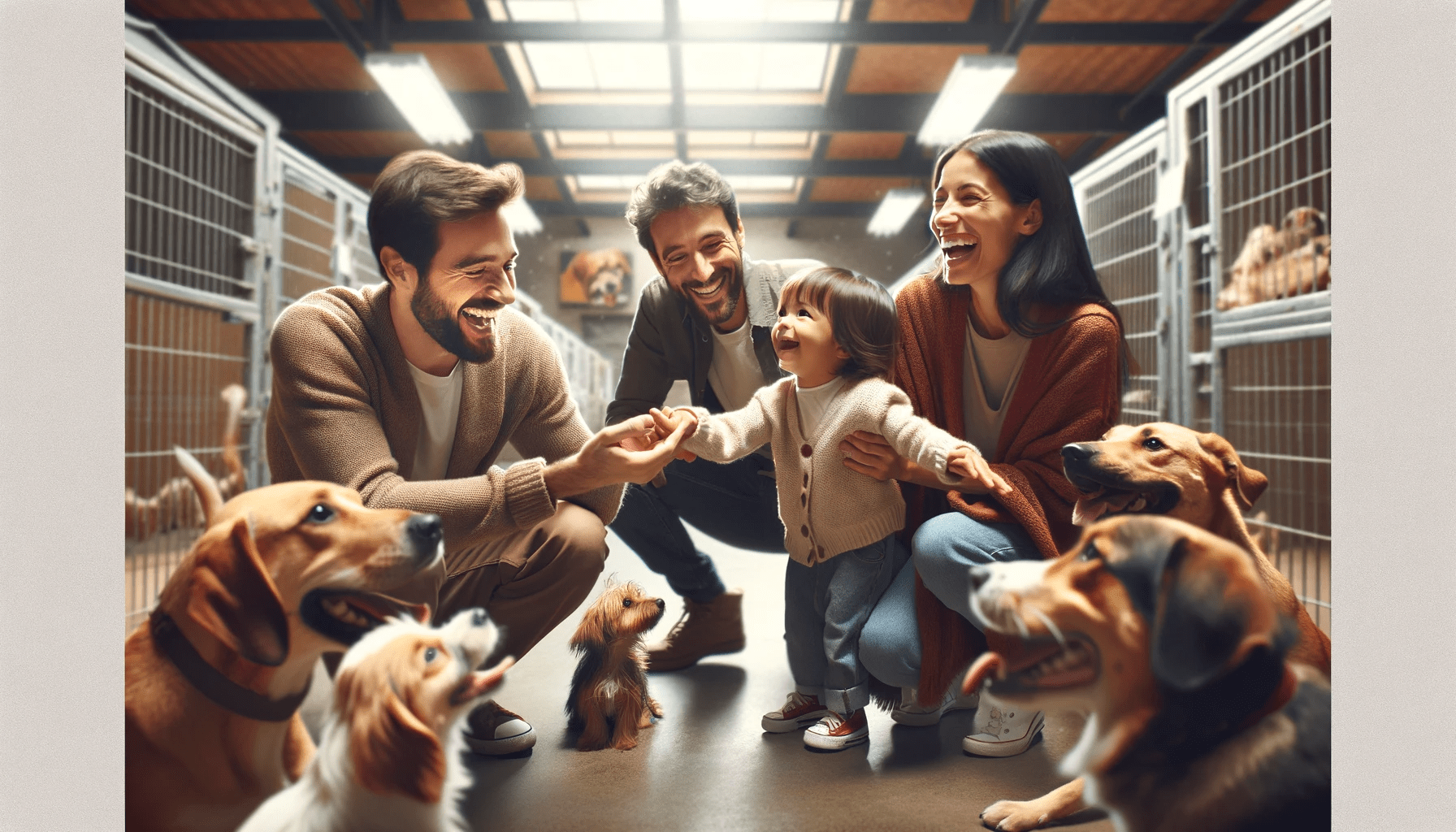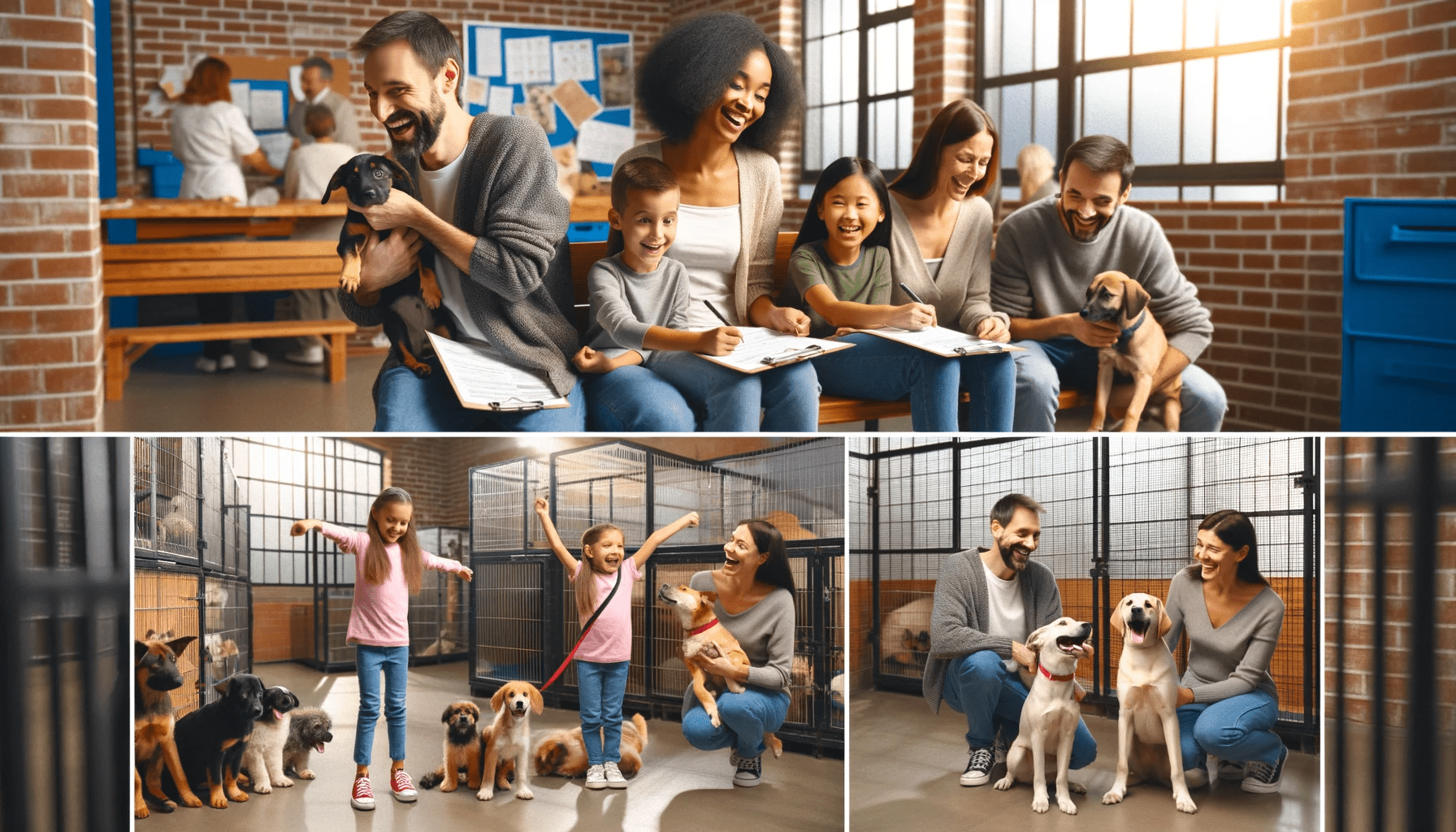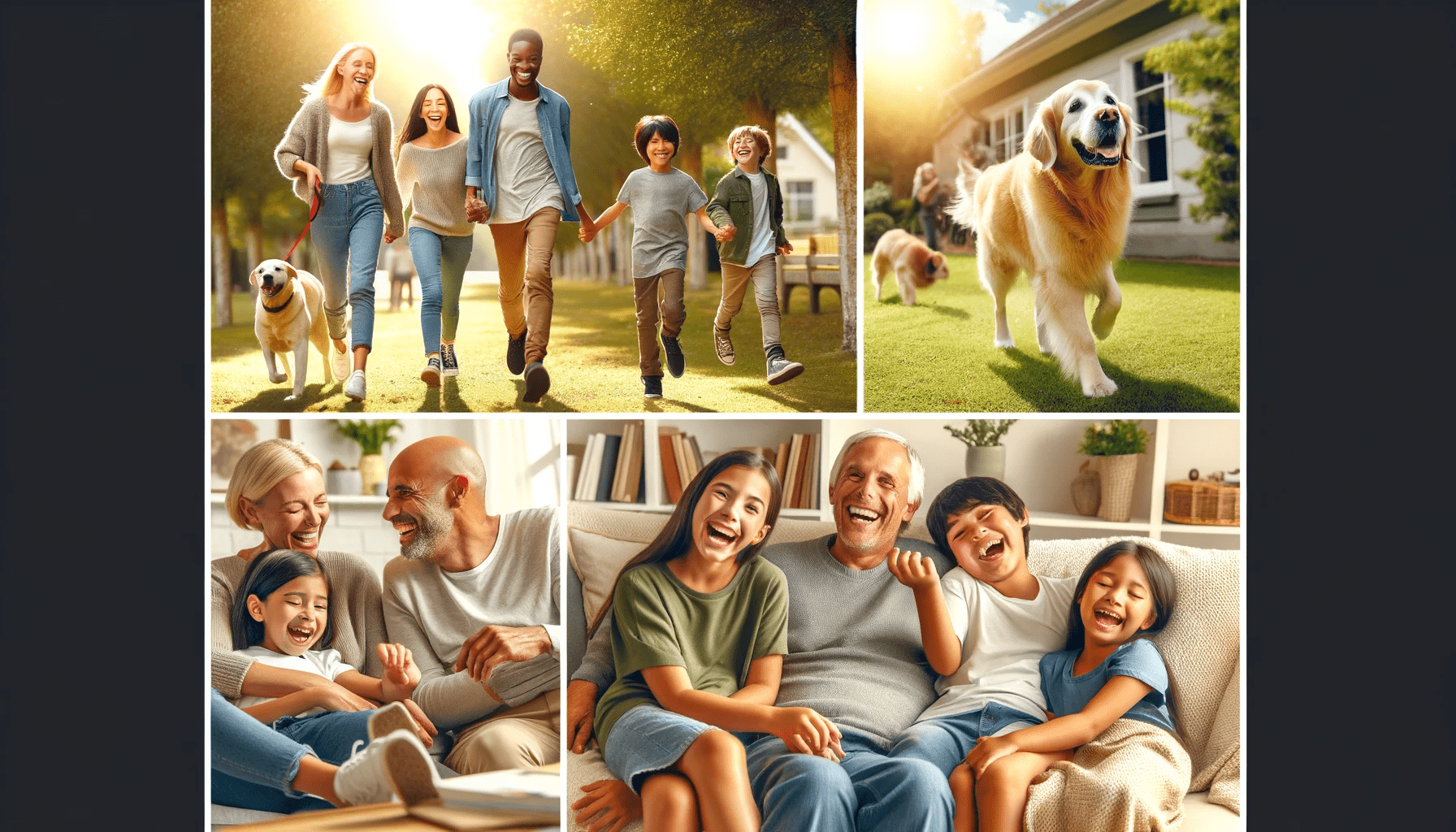Looking for the perfect furry companion to match your lifestyle? Look no further! In this article, we'll guide you through the process of finding the ideal adoptable dog that fits seamlessly into your life.
Assess your lifestyle, activity level, living situation, and time commitment. Consider your personality traits and any special needs or preferences.
Research different dog breeds and consult with adoption agencies.
Get ready to welcome your new best friend into your home!
Key Takeaways
- Assess your schedule, activity level, and living situation to determine if you have enough time and energy to devote to a dog
- Match your energy levels with a dog's exercise requirements and consider different breeds' exercise needs
- Evaluate your living situation and look for breeds that adapt well to smaller spaces or require more outdoor exercise
- Consider your time commitment, willingness to train and socialize, and financial commitment when deciding to adopt a dog
Assessing Your Lifestyle
Assess your lifestyle to determine the best fit for an adoptable dog. When it comes to finding the right match, it's crucial to consider your schedule and how it aligns with the needs of a dog. Dogs require time, attention, and exercise, so it's essential to be honest with yourself about how much time and energy you can devote to a furry companion.
Start by evaluating your daily routine. Consider your work schedule, social commitments, and personal activities. Are you away from home for long hours? If so, a high-energy breed may not be the best fit for you. On the other hand, if you have a flexible schedule or work from home, you may have more time to dedicate to a dog's needs.
Think about your activity level as well. If you're an active person who enjoys outdoor activities, a dog that loves exercise and adventure would be a great match. However, if you prefer a more laid-back lifestyle, a dog with lower energy levels might be a better fit.
It's also important to consider the size of your living space. Some dogs require more space to roam and play, while others are content in smaller environments. Assessing your living situation will help you determine the appropriate size and energy level of the dog that would thrive in your home.
Understanding Your Activity Level
Consider your activity level to determine the type of dog that will best suit your lifestyle and energy levels. Assessing your physical capabilities and determining the exercise needs of a potential furry companion are crucial factors in finding the perfect match.
To help you make an informed decision, here are some essential points to consider:
- Your Daily Routine:
- Evaluate your daily schedule to determine how much time you can dedicate to exercising and engaging with your dog.
- Consider your work hours, commitments, and other responsibilities that may affect your availability.
- Your Energy Levels:
- Be honest with yourself about your energy levels. Are you an active person who enjoys outdoor activities, or do you prefer a more relaxed and laid-back lifestyle?
- Matching your energy levels to your dog's exercise requirements will ensure a harmonious and balanced relationship.
Remember, different dog breeds have varying exercise needs. Some breeds require extensive physical activities like long walks or runs, while others are content with shorter play sessions. Understanding your activity level is crucial in finding a dog that can keep up with your lifestyle and provide the companionship you desire.
Considering Your Living Situation
Evaluate your living situation to determine the type of environment that will best accommodate a dog and support their needs. Whether you live in an apartment or a house with plenty of outdoor space, it's important to consider how your living situation will impact your potential furry friend.
If you live in an apartment, you need to ensure that the dog you choose will be comfortable in a smaller living space. Look for breeds that are known to adapt well to apartment living, such as small or medium-sized dogs. These dogs are usually more content with less space and don't require as much exercise as larger breeds. Additionally, consider the noise level in your apartment complex and whether it would be suitable for a dog that may bark more frequently.
On the other hand, if you have a house with outdoor space, you have more flexibility in terms of the type of dog you can adopt. Dogs that require more exercise and enjoy spending time outdoors, such as sporting or herding breeds, may be a better fit for your living situation. Remember that these dogs will need regular exercise and mental stimulation, so having a backyard or nearby parks can greatly benefit them.
No matter your living situation, it's crucial to always prioritize the well-being and comfort of your dog. Taking the time to evaluate your living situation and choosing a dog that aligns with it will ensure a harmonious and fulfilling relationship with your new furry companion.
Evaluating Your Time Commitment
Take into account how much time you can realistically devote to a dog, as their well-being and happiness depend on your ability to provide them with the attention and care they need. Evaluating your time commitment is crucial to ensure that you can meet the demands of owning a dog. Here are some key factors to consider:
- Daily Routine:
- Are you busy with work or other commitments that limit your availability during the day?
- Can you commit to regular exercise and playtime?
- Do you have the flexibility to accommodate a dog's schedule?
- Training and Socialization:
- Are you prepared to invest time in training your dog?
- Will you be able to attend obedience classes or hire a professional trainer?
- Can you commit to providing your dog with opportunities for socialization?
Evaluating your financial commitment is also essential when considering the time you can dedicate to a dog. Owning a dog involves expenses such as food, veterinary care, grooming, and supplies. These costs should be factored into your budget and considered alongside your time availability.
Additionally, finding the right training approach is crucial to ensure that you can effectively communicate with and teach your dog. Understanding your own training preferences, whether it's positive reinforcement or other methods, will help you find the approach that aligns best with your available time and resources.
Matching Your Personality Traits
When finding the perfect adoptable dog, it's important to assess how well your personality traits align with the dog's temperament and needs. Matching dog breeds with your personality compatibility is crucial to ensure a harmonious and fulfilling relationship with your new furry friend.
Different dog breeds have distinct personality traits that may or may not complement your own. For example, if you lead an active lifestyle and enjoy outdoor activities, a high-energy breed like a Border Collie or Australian Shepherd might be a great match. These breeds thrive on physical exercise and mental stimulation, making them perfect companions for adventurous individuals.
On the other hand, if you prefer a more relaxed and laid-back lifestyle, a breed like a Bulldog or Basset Hound might be a better fit. These breeds are known for their calm demeanor and low exercise requirements, making them ideal for those who enjoy a quieter pace of life.
Personality compatibility isn't limited to energy levels alone. Some breeds are more independent and aloof, while others are affectionate and seek constant attention. Consider whether you want a dog that will be by your side at all times or one that's more self-sufficient.
Researching Dog Breeds
When researching dog breeds, it's important to consider their temperament and compatibility with your lifestyle. Some breeds are known to be more laid-back and easygoing, while others are more active and energetic.
It's also essential to look into their exercise and energy requirements, as certain breeds may require more physical activity and mental stimulation than others.
Additionally, grooming and shedding tendencies should be taken into account to ensure that you're prepared for the amount of maintenance required to keep your dog looking and feeling their best.
Breed Temperament and Compatibility
To find a dog breed that suits your lifestyle, it's important to research breed temperament and compatibility through reputable sources. Understanding a breed's size and exercise needs, as well as its temperament and how it fits into different family dynamics, can help you make an informed decision.
Here are a few things to consider:
- Breed Size and Exercise Needs:
- Some breeds are small and require minimal exercise, making them suitable for apartment living or for people with limited mobility.
- On the other hand, larger breeds often have higher exercise needs and require more space to roam and play.
- Breed Temperament and Family Dynamics:
- Certain breeds are known for being gentle and patient, making them great choices for families with young children or other pets.
- Other breeds may be more independent and less tolerant of children or other animals, so it's important to consider your family's dynamics when selecting a breed.
Exercise and Energy Requirements
Want to determine the exercise and energy requirements of different dog breeds to find the perfect match for your lifestyle? Understanding a dog's exercise routines and energy levels is crucial in ensuring a compatible match. Different breeds have varying exercise needs and energy levels, so it's important to consider your own activity level and how much time you can dedicate to exercising your furry companion.
High-energy breeds, such as Border Collies or Australian Shepherds, require daily vigorous exercise to keep them mentally and physically stimulated. On the other hand, low-energy breeds, like Bulldogs or Pugs, may be content with shorter, less intense exercise sessions.
Grooming and Shedding Tendencies
To research dog breeds and their grooming and shedding tendencies, begin by understanding the level of maintenance required for different dogs. Grooming frequency and shedding management are important factors to consider when choosing a dog that matches your lifestyle. Here are some insights to help you make an informed decision:
- Grooming frequency:
- Some breeds require regular grooming, such as daily brushing or trips to the groomer.
- Other breeds have low maintenance needs, only needing occasional brushing or grooming.
- Shedding management:
- Certain breeds shed heavily throughout the year, requiring frequent vacuuming and lint rolling.
- On the other hand, some breeds have minimal shedding, making them ideal for those with allergies or who prefer a cleaner home.
Considering Special Needs or Preferences
When considering a dog that matches your lifestyle, it's important to think about compatibility and meeting specific requirements.
Take into account your daily routine, energy level, and living situation to determine if a dog's needs align with yours.
Additionally, consider any special needs or preferences you may have, such as allergies, size constraints, or activity level, to ensure a harmonious match between you and your potential canine companion.
Lifestyle and Compatibility
Consider your family's lifestyle and preferences when choosing a dog that's compatible with your unique needs. Assessing compatibility is crucial to ensure a harmonious relationship between you and your new furry friend. Here are some key points to consider:
- Activity Level:
- Do you lead an active lifestyle or prefer a more relaxed pace?
- Are you looking for a dog that enjoys long hikes or one that's content with short walks around the block?
- Living Space:
- Do you live in a small apartment or a house with a backyard?
- Are you open to regular grooming if you choose a breed with a longer coat?
Meeting Specific Requirements
Find a dog that meets your specific needs and preferences by considering any special requirements. When assessing compatibility, it's crucial to understand your preferences and what you're looking for in a furry companion. Take into account factors such as size, energy levels, exercise needs, and temperament.
If you have allergies, consider hypoallergenic breeds. If you have a sedentary lifestyle, a low-energy dog may be a better fit. On the other hand, if you're an active individual, a high-energy breed could be ideal. Additionally, if you have children or other pets, it's important to find a dog that's known for being good with kids or other animals.
Consulting With Adoption Agencies
To begin the process of finding your perfect adoptable dog, consult with adoption agencies that can help match you with the right companion for your lifestyle. Adoption agencies are experts in the adoption process and have a deep understanding of adoption criteria. Here's how consulting with adoption agencies can benefit you:
- Expertise: Adoption agencies have extensive knowledge and experience in the adoption process. They can guide you through the entire journey, from understanding the requirements to completing the necessary paperwork. Their expertise ensures a smooth and successful adoption process.
- Matching process: Adoption agencies have a thorough matching process that takes into account your lifestyle, preferences, and the dog's needs. They'll ask you questions about your daily routine, activity level, and other factors to help find a dog that aligns with your lifestyle. This personalized approach increases the chances of finding the perfect match.
- Access to a variety of dogs: Adoption agencies work with a wide range of dogs, including different breeds, sizes, and ages. They have access to a diverse pool of adoptable dogs, increasing the likelihood of finding a dog that matches your criteria.
Consulting with adoption agencies not only streamlines the adoption process but also ensures that you find the right dog that fits perfectly into your lifestyle. Their expertise and personalized approach make the adoption journey a rewarding and fulfilling experience.
Frequently Asked Questions
How Much Does It Cost to Adopt a Dog From an Adoption Agency?
Adopting a dog from an adoption agency can vary in cost, depending on factors like breed and age. However, the cost of dog ownership goes beyond initial fees. The benefits of adopting a dog are immeasurable and can bring immense joy to your life.
What Are Some Common Health Issues That Certain Dog Breeds May Have?
When considering adopting a dog, it's important to be aware of common health issues in certain breeds. Factors to consider include the breed's predisposition to certain conditions and the cost of potential medical treatment.
Are There Any Specific Dog Breeds That Are More Suitable for Apartment Living?
Living in a small apartment? Consider dog breeds like the French Bulldog or Cavalier King Charles Spaniel. They thrive in smaller spaces and require less exercise. Don't forget the benefits of adopting a senior dog!
How Can I Determine if a Dog Has Any Behavioral Issues Before Adopting?
To determine if a dog has behavioral issues before adopting, observe their behavior in different situations, interact with them, and ask shelters or previous owners about their behavior. Training techniques can help address any issues that arise.
Are There Any Adoption Agencies That Specialize in Certain Dog Breeds or Sizes?
Are there adoption agencies that specialize in certain dog breeds or sizes? Yes, there are! These agencies can help you find a dog that matches your lifestyle and preferences, ensuring a perfect fit for you and your new furry friend.
Conclusion
In conclusion, finding the perfect adoptable dog that matches your lifestyle requires careful consideration of various factors.
By assessing your activity level, living situation, time commitment, and personality traits, you can narrow down your options.
Researching different dog breeds and considering any special needs or preferences you may have is also crucial.
Finally, consulting with adoption agencies can provide valuable guidance and assistance in finding the ideal furry companion for you.
Remember, a well-matched dog can bring immense joy and fulfillment to your life.






